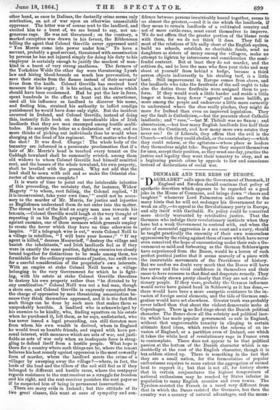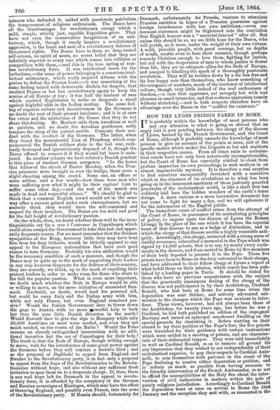DENMARK AND THE REDS OF EUROPE.
"DA.GBLA.DET" calls upon the Government of Denmark, if England and Sweden should continue that policy of apathetic desertion which appears to be regarded as a good joke in the House of Commons, and brings down "cheers and laughter" whenever Lord Palmerston adds another to the many hints that he will not endanger his Government for so weak an ally,—to appeal to the Revolutionary party in Europe, and ally itself with Garibaldi. No policy could be conceived more strictly warranted by retributive justice. That the Germans who indulge their revolutionary instincts when they have but a weak Government to contend with, and when the prize of successful aggression is a sea coast and a navy, should be taught practically the enormity of their own remorseless oppressions by the rising against them of races which have never even conceived the hope of encountering under their rule a Go- vernment so mild and forbearing as the German Schleswigers have experienced from the Danes, would be a lesson of such perfect poetical justice that it seems scarcely of a piece with the inscrutable movements of the Providence of history. But we confess we doubt very much that the Danes will have the nerve and the vivid confidence in themselves and their cause to have recourse to that final and desperate remedy. They have already shown pretty clearly that they are not a revolu- tionary people. If they were probably the German influence would never have gained head in Schleswig as it has done,— there would have been a more energetic resistance to the in- vasion of foreign social elements, and the tide of German emi- gration would have set elsewhere. Greater trash was probably never talked than that about the violent democratic mobs at Copenhagen. There ino Red tinge about the Danish political character. The Danes show all the sobriety and political iner- tia which has made popular government so safe in England, without that ungovernable tenacity in clinging to certain ultimate fixed ideas, which renders the scheme of an in. vasion of England, or a partition even of Ireland, one which it takes the white heat of revolutionary rage in France even to contemplate. There does not appear to be that political passion at the bottom of the Danish character which is un- doubtedly at the root of the English character, though it is but seldom stirred up. There is something in the fact that they are a small nation, for the fermentation of popular enthusiasms requires to some extent the aggregation of animal heat to support it ; but that is not all, for history shows that in certain conjunctures the highest temperature of national enthusiasm may be reached by States inferior in population to many English counties and even towns. The Tyrolese resisted the French in a mood very different from that in which the Danes resisted the Germans, but then the country was a country of natural advantages, and the menu- taineers who defended it, united with passionate patriotism the temperament of religious enthusiasm. The Danes have all the disadvantages for revolutionary energy 'which a mild, simple, strictly just, equable disposition gives. They have not even the conservative haughtiness of an aris- tocracy, which, though it rarely inspires a revolutionary aggression, is the heart and soul of a revolutionary defence of threatened rights. The Danes have in them no deep-rooted self-esteem, no spirit of scorn, no secret belief that they are infinitely superior to every race which comes into collision or competition with them,—and this is the true spring of rest- less revolutionary force. It Was intellectual scorn for the barbarians,—the sense of power belonging to a conscious intel- lectual aristocracy, which really inspired Athens with the genius to defeat the Persian hosts ;—it was something of the same feeling mixed with democratic disdain for despots, that enabled France in her last revolutionary agony to keep the armies of all Europe at bay ; it was half the hauteur of race which enabled Englishmen to make so desperate a stand against frightful odds in the Indian mutiny. The same feel- ing of superior culture and inventiveness in tile Germans is no doubt the root of their present insolence ; and it is at once the virtue and the misfortune of the Danes that they do not &me this feeling. Mr. Herbert culls them Arcadians as well as patriots, and no doubt the Arcadian gentleness sadly tempers the sting of the patriot mettle. Compare their con- duct with the conduct of the Germans. The latter, when they found the monumental Lion at Flensborg which com- memorated the Danish soldiers slain in the last war, ruth- lessly destroyed and ignominiously disposed of it, though the Danes offered to remove it if they would but leave it unin- jured. In another column we have related a Danish pendant to this piece of insolent German arrogance. "In the hours that followed the attack of Easter Monday, when the Prus- sian prisoners were brought in over the bridge, there arose a slight cheering among the crowd. Some one, an officer or some soldier, said a few words—how these were men who were suffering now what it might be their captors' turn to suffer some other day,—and the rest of the march was made in dead and respectful silence." We should be glad to think that a common English crowd would act in the same way after a success gained under such circumstances, but we scarcely think they would have the self-command and respect for their invaders. The Danes are too mild and good for the full height of revolutionary passion. On the whole, then, we doubt whether there will be the inex- tinguishable cry for a war a l' outranee in Copenhagen which could alone compel the Government to take this last and appar- ently desperate course. For we must remember that the German sympathies of the King, however little they may have bent him from his duty hitherto, would be bitterly opposed to any appeal to the European nationalities that have such good reason to hate Germany. Probably his own abdication would be the necessary condition of such a measure, and though the Danes may be quite up to the mark of supporting their leaders in any step however desperate for the defence of their country, they are scarcely, we think, up to the mark of expelling their present leaders in order to make room for those who share to the full the popular passion. What is even more important, we doubt much whether the Reds in Europe would be able or willing to move, on the mere initiative of unassisted Den- mark. Garibaldi, no doubt, would lend his personal aid, • but could he carry Italy and the Italian army with him, while not only France but even England remained pas- sive? Would the Italian Government dare to throw down the gage to Austria with no more powerful help to back her than the poor little Danish diversion in the north ? Would Kossuth dare to give the sign to Hungary while only 50,000 Austrians at most were needed, and even they not much needed, on the coasts of the Baltic ? Would the Poles resume an already extinguished insurrection with no addi- tional incentive but the cry of Copenhagen for their help ? The truth is that the Reds of Europe, though willing enough to move, wait for the interference of some great power against the Germane before they will venture a decisive blow ; and BO the proposal of Dagblaclet to appeal from England and Sweden to the Revolutionary party, is in fact only a proposal to appeal from the hope of the Revolutionaries to the Revolu- tionaries without hope, and also without any sufficient fresh irritation to spur them on to a desperate charge. If, then, there is any real hope left for Denmark in the appeal to revolu- tionary force, it is afforded by the conspiracy of the German and Russian sovereigns at Kissingen, which may have the effect of throwing England, and possibly even France, into the arms of the Revolutionary party. If Russia should, fortunately for Denmark, unfortunately for Prussia, venture to stimulate Prussian ambition in hopes of a Prussian guarantee against foreign interference with her own ambitions,—even our dormant statesmen might be frightened into the conviction that English honour was a "material interest" after all. But unless this should be so, we see little hope for the Danes, who will perish, as it were, under the weight of their own virtues. A mild, placable people, with great courage, but no depths of wrath, unable even to hate their enemies, though perhaps scarcely Christian enough to love them, fighting for justice, but not with the desperation of men to whom justice is dearer than life, they are no adequate allies for the Reds of Europe, and unequal to kindling the spark of a thoroughly passionate revolution. They will be trodden down by a far less free and far less happy race than themselves, who know something of the arrogance of numbers, much of the insolence of intellectual culture, though very little indeed of the real enthusiasm of freedom,—a race that oppresses, not savagely but with real pleasure in small tyrannies, and that endures oppression tamely without shrinking,—and in both reipects therefore have am advantage over the Danes in the "conflict for existence."































 Previous page
Previous page